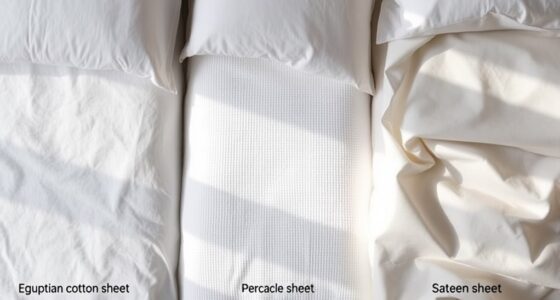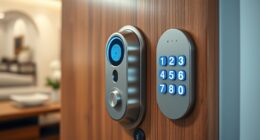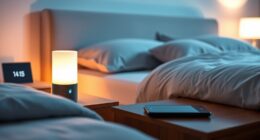Weighted blankets promote relaxation by applying gentle deep touch pressure, which helps calm your nervous system. This stimulation releases mood-enhancing hormones like serotonin and oxytocin, making it easier for you to fall asleep and stay asleep. They also reduce anxiety by lowering cortisol levels and promoting feelings of security. If you’d like to know more about how these blankets can improve your sleep and reduce stress, keep exploring the details below.
Key Takeaways
- Weighted blankets provide deep touch pressure, activating calming hormonal responses like serotonin, oxytocin, and melatonin.
- They help reduce cortisol levels, lowering stress and anxiety while promoting relaxation and emotional stability.
- Using a blanket about 10% of body weight can improve sleep onset, duration, and reduce nighttime awakenings.
- They are a non-invasive, long-term option to manage sleep difficulties and anxiety, with minimal side effects when used properly.
- More rigorous research is needed, but current evidence suggests weighted blankets are effective complementary tools for sleep and anxiety relief.
Understanding the Concept of Weighted Blankets
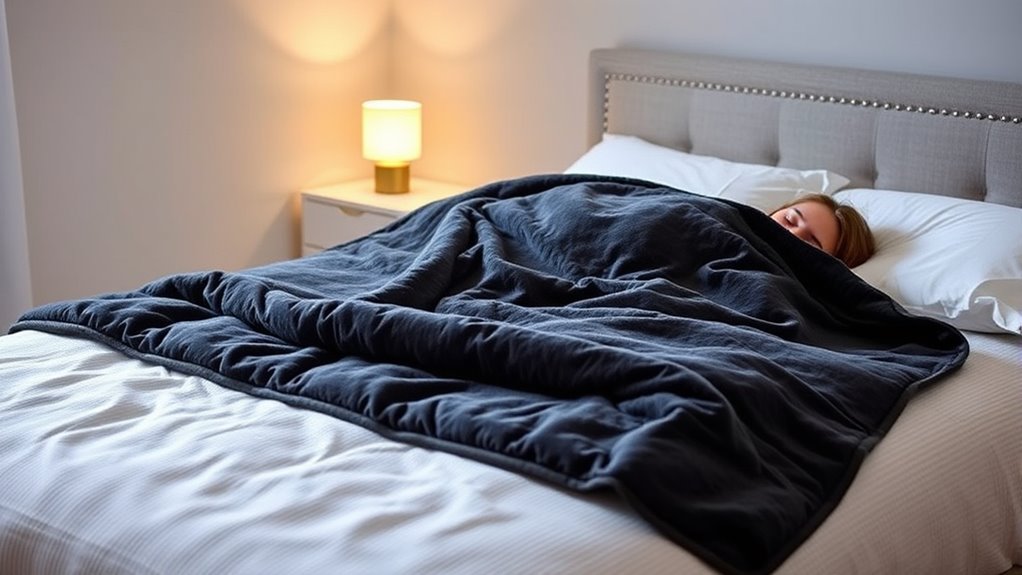
Weighted blankets are specially designed covers filled with materials like glass beads, plastic pellets, or sand to provide therapeutic pressure. This pressure, known as deep touch pressure, gently applies consistent weight across your body, mimicking a comforting hug. Typically weighing between 3 to over 20 pounds, weighted blankets are crafted to be about 10% of your body weight for safety and maximum benefit. Unlike regular comforters, they have internal weights sewn into pockets or channels for even distribution. Originally created for sensory and behavioral therapy, these blankets have gained popularity for improving sleep and reducing anxiety. When you use a weighted blanket, the deep touch pressure creates a calming effect that can help you relax and fall asleep more easily, supporting better sleep quality overall.
Physiological Effects and How They Promote Relaxation
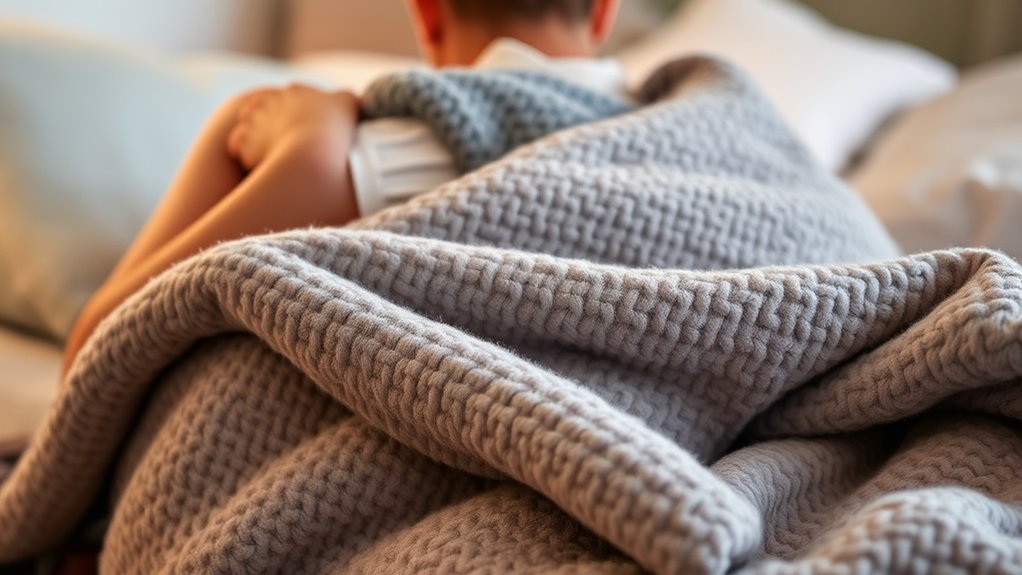
When you use a weighted blanket, the gentle, deep touch pressure stimulates your nervous system, triggering a calming response throughout your body. This pressure activates brain centers that control involuntary functions like heart rate, blood pressure, and respiration, leading to a sense of relaxation. It also encourages the release of serotonin and oxytocin, hormones that enhance mood and reduce anxiety. Additionally, this stimulation boosts melatonin production, helping regulate your sleep-wake cycle. The physiological effects work together to promote deeper, more restful sleep and decrease stress. Incorporating pressure therapy into your routine can further enhance these calming benefits. Understanding the neurobiological mechanisms involved can help optimize the use of weighted blankets for sleep and anxiety relief. Exploring the role of automation technologies in health applications reveals ongoing innovations that can support relaxation techniques. Combining weighted blankets with other lifestyle strategies can maximize their effectiveness. For example, integrating mindfulness practices can amplify the relaxation response. Here’s a visual summary:
| Effect | Result |
|---|---|
| Deep touch pressure | Calms nervous system |
| Serotonin and oxytocin | Improves mood, reduces anxiety |
| Melatonin production | Enhances sleep regulation |
| Overall physiological response | Promotes relaxation and restful sleep |
Evidence Supporting Sleep Improvements

Numerous studies have demonstrated that using weighted blankets can lead to measurable improvements in sleep quality. Research shows that weighted blankets help you fall asleep faster, stay asleep longer, and experience fewer nighttime awakenings. A meta-analysis confirms that these blankets substantially reduce anxiety symptoms, which further enhances sleep quality. Studies involving young adults indicate increased melatonin production when using weighted blankets, suggesting a physiological benefit to sleep. Participants often report feeling calmer and more relaxed, making it easier to shift into restful sleep. Additionally, some evidence from Honda Tuning suggests that targeted modifications can enhance overall comfort, which may indirectly support better sleep. While these findings are promising, it’s important to note that large-scale, high-quality research is limited, and individual results may vary. Overall, the evidence suggests that weighted blankets can be a helpful tool for improving your sleep.
Impact on Anxiety and Stress Reduction
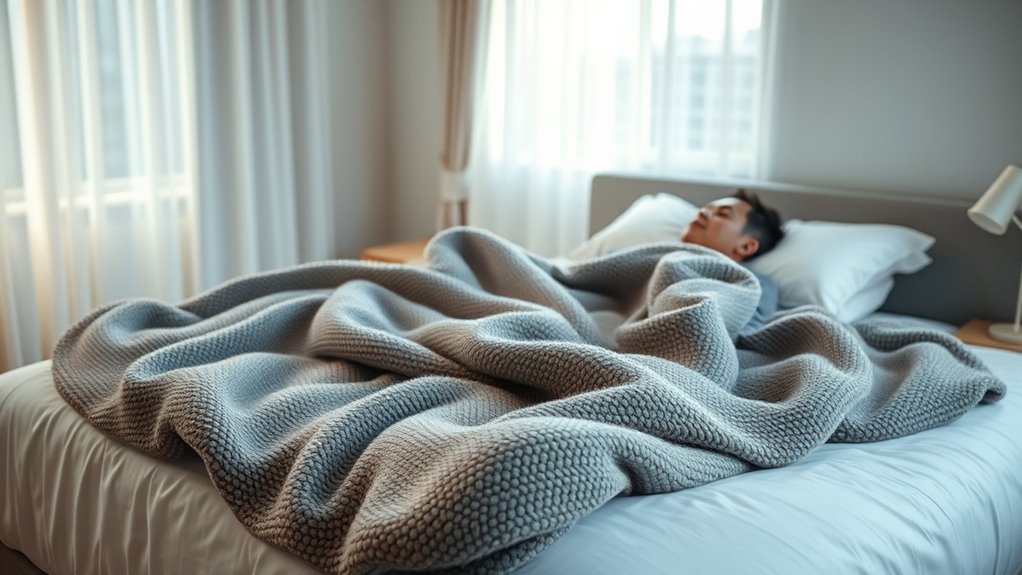
Weighted blankets activate your body’s calming response by applying gentle, deep pressure that soothes your nervous system. This can help lower cortisol levels and promote hormonal balance, reducing feelings of anxiety and stress. Many people find that using a weighted blanket makes them feel safer and more relaxed, supporting overall stress management. Additionally, the calming effects of weighted blankets may influence dream experiences, creating a more restful sleep environment. For example, the use of comfortable and well-designed dog beds for Golden Retrievers can enhance relaxation and provide additional comfort during rest. Incorporating appropriate sleep accessories can further optimize the calming benefits and improve sleep quality.
Calming Nervous System Response
The gentle, consistent pressure of a weighted blanket stimulates your nervous system to promote relaxation and reduce stress hormones. This deep touch pressure activates your calming nervous system, helping to manage anxiety and promote a sense of well-being. As you experience this gentle pressure, your heart rate and blood pressure decrease, creating a more restful state. The stimulation triggers the release of feel-good chemicals like serotonin and oxytocin, which further enhance your mood and reduce anxiety. By engaging the parasympathetic nervous system, weighted blankets help shift your body from alertness to relaxation. This calming sensory input can markedly decrease anxiety symptoms, making it easier to unwind and feel more at peace. Incorporating air quality improvements in your sleeping environment can further enhance relaxation and overall sleep quality. Additionally, maintaining good sleep hygiene can optimize the calming effects of weighted blankets and support healthier sleep patterns. Research also indicates that consistent use of weighted blankets can help regulate nervous system responses over time, promoting ongoing benefits for anxiety management. Furthermore, the gentle pressure may also positively influence dog names that evoke feelings of comfort and safety, creating a soothing environment conducive to restful sleep for both humans and pets. Moreover, understanding the importance of projector contrast ratio can help optimize your home theater setup for a more immersive experience.
Hormonal Balance Effects
As the calming effects of weighted blankets influence your nervous system, they also trigger hormonal responses that enhance relaxation. These hormonal effects include increasing serotonin levels, which helps stabilize your mood and promote feelings of well-being. The gentle pressure from the blanket stimulates the release of oxytocin, reducing stress and fostering a sense of safety. Additionally, some studies show that using weighted blankets boosts melatonin production, supporting better sleep. Importantly, these hormonal changes also lower cortisol levels, the hormone associated with stress and anxiety. By modulating these hormones, weighted blankets help create a neuroendocrine balance that reduces overall anxiety and promotes a more relaxed state, making it easier to unwind and achieve restful sleep. Understanding narcissistic behavior can help individuals recognize when stress or anxiety may be related to relational dynamics and seek appropriate support. Moreover, the regulation of these hormones may also positively influence newborn sleep patterns, contributing to longer and more restful sleep cycles. Furthermore, supporting hormonal balance through calming interventions like weighted blankets can enhance overall emotional resilience and well-being. Additionally, the calming effects may help to regulate sleep hormones, leading to more consistent sleep patterns over time. In addition, such hormonal regulation can contribute to improvements in mood stability, especially for those experiencing anxiety or stress-related disorders.
Anxiety Symptom Reduction
Using a weighted blanket can considerably reduce anxiety symptoms by calming your nervous system. The gentle, evenly distributed pressure from weighted blankets activates deep touch pressure receptors, which help lower cortisol levels and promote relaxation. Multiple studies show that using weighted blankets can lead to significant reductions in anxiety, with some research indicating notable improvements over several weeks. This pressure also stimulates the release of feel-good hormones like oxytocin and serotonin, helping to alleviate stress and improve mood. Additionally, the calming effects of deep touch pressure can enhance sleep quality and overall well-being. While the evidence supports their benefits, the quality of studies varies, and more rigorous research is needed to confirm long-term effects. Overall, weighted blankets are a practical tool for easing anxiety and managing stress, offering a natural calming experience. Additionally, understanding the digital literacy programs available can help seniors safely incorporate these calming tools into their routines.
Recommendations for Safe and Effective Use
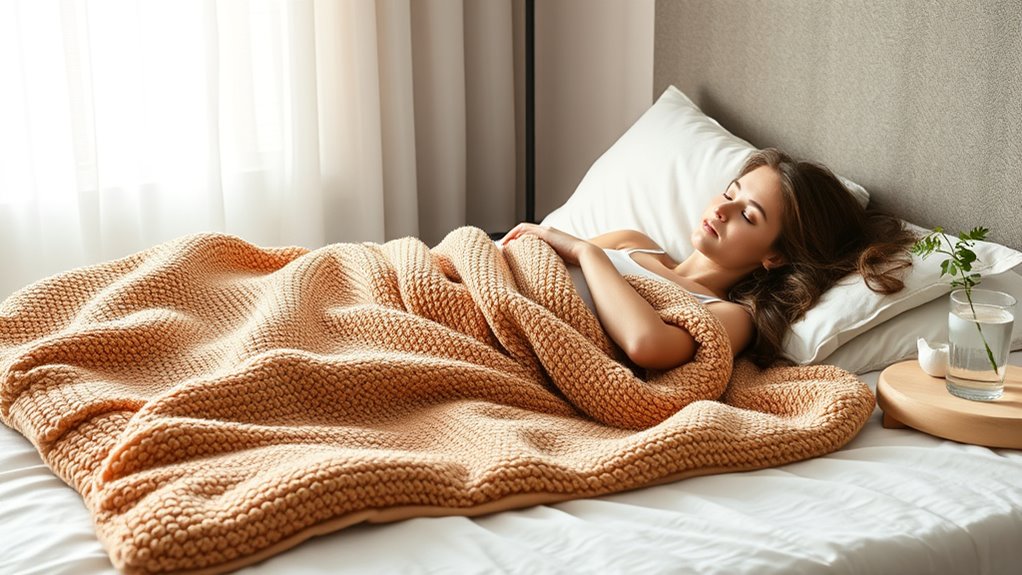
Choosing the right weight is essential for safe and effective use; aim for about 10% of your body weight. If you have health conditions like sleep apnea or circulatory issues, it’s best to consult a healthcare professional before trying a weighted blanket. Always select breathable materials to prevent overheating and make sure you can easily remove the blanket if needed. Being aware of divorce statistics and regional legal resources can help you understand the importance of proper guidance during transitions. Additionally, understanding city dynamics can assist in creating a comfortable sleep environment tailored to your new lifestyle.
Proper Weight Selection
Selecting the right weight for your weighted blanket is essential for both safety and comfort. Proper weight selection typically means choosing a blanket around 10% of your body weight. This ensures the blanket provides gentle pressure without causing discomfort or restricting movement. Avoid heavier blankets, as they can pose health risks or make it difficult to move during sleep. When choosing, consider your personal preferences, sleep habits, and any medical conditions that might affect comfort or safety. An evenly distributed weight across your body enhances effectiveness and prevents uneven pressure points. If you’re unsure about the ideal weight, it’s best to seek medical advice, especially if you have health concerns or use the blanket for children or older adults. Proper weight selection maximizes benefits and minimizes risks.
Medical Consultation Importance
Getting the right weight for your weighted blanket is important, but guaranteeing safe and effective use requires medical guidance. A medical consultation helps you determine if a weighted blanket is suitable for your specific health needs. It’s especially vital if you have underlying conditions like sleep apnea, asthma, or circulatory issues. Proper guidance from a healthcare professional ensures you select the correct weight and learn how to use it safely. They can also advise on integrating the blanket into your overall treatment plan for anxiety or sleep disorders. Regular medical consultation helps monitor for potential risks and ensures your use of the blanket supports your health.
- Understand which conditions might contraindicate use
- Receive personalized recommendations for safe use
- Guarantee the blanket complements other treatments and therapies
Limitations and Gaps in Current Research
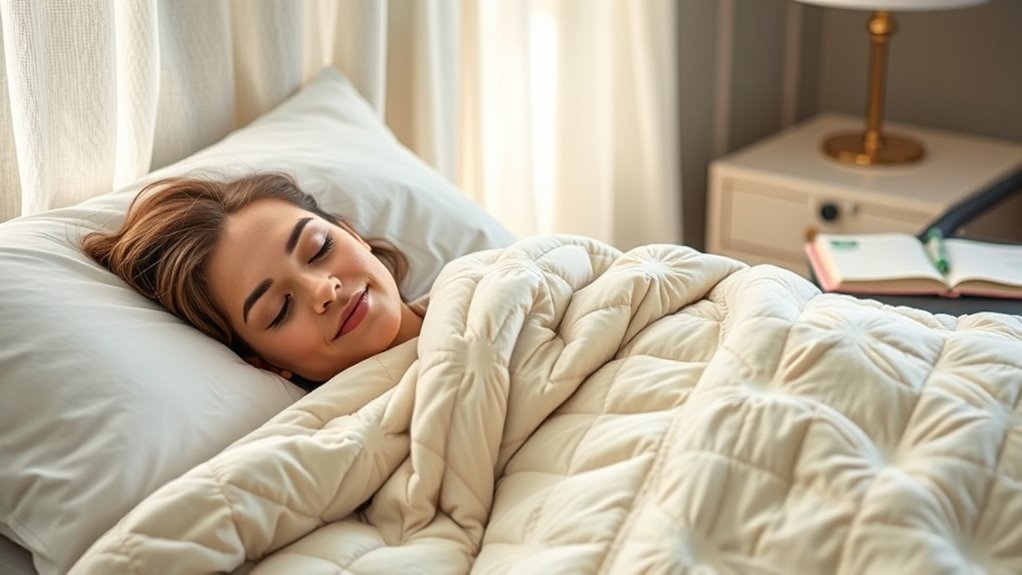
Despite growing interest in weighted blankets as a sleep aid, current research faces significant limitations that hinder definitive conclusions. Most studies have small sample sizes and lack rigorous randomized controlled designs, leading to study limitations in reliability. Variability in methodologies—different outcome measures and study durations—creates research gaps and makes findings hard to compare. Additionally, many studies depend on subjective reports, with few using objective physiological data. There’s also a scarcity of long-term research assessing safety and effectiveness over extended periods. These limitations reveal critical research gaps, especially in identifying which populations benefit most and understanding underlying mechanisms.
| Study Limitations | Impact |
|---|---|
| Small sample sizes | Reduced generalizability |
| Lack of randomized controlled trials | Limited causal inference |
| Heterogeneous methods | Difficult comparison of results |
| Reliance on subjective reports | Potential bias |
| Short study durations | Insufficient long-term data |
Comparing Weighted Blankets to Other Sleep Aids
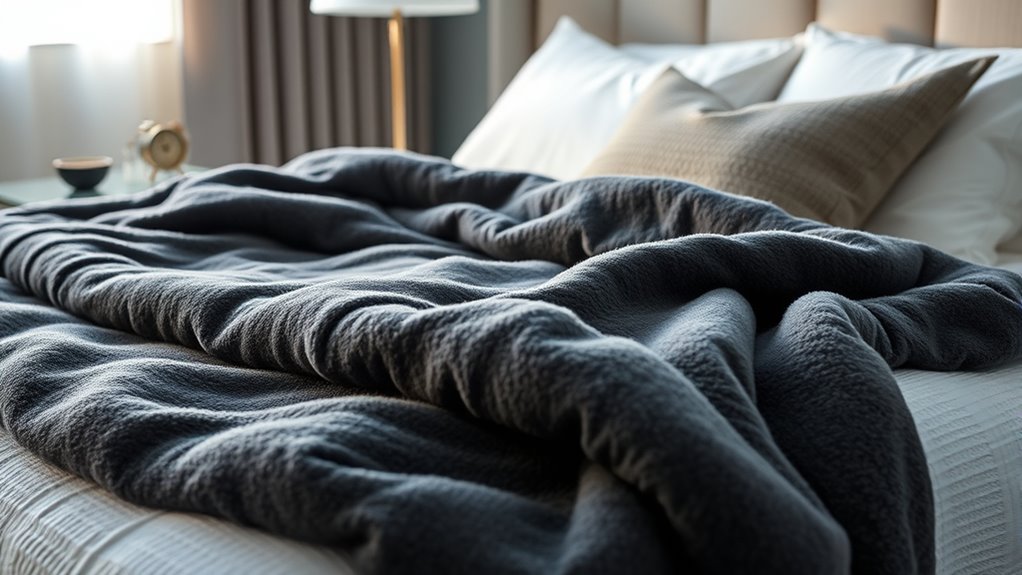
Compared to pharmacological sleep aids, weighted blankets offer a non-invasive way to promote relaxation through deep touch pressure, which can help reduce anxiety and improve sleep quality. Unlike medications, they don’t carry risks of dependency and are generally safer for long-term use. However, their effects are less immediate and predictable. You might find them helpful as a supplementary sleep aid, especially if anxiety levels are high. To visualize, imagine:
Weighted blankets offer a safe, non-invasive way to reduce anxiety and improve sleep, complementing other treatments.
- Resting under a cozy, evenly distributed weight that calms your nervous system
- Using weighted blankets alongside other techniques for a more holistic approach
- Experiencing gradual sleep improvements without medications’ side effects
While weighted blankets help some people relax and fall asleep, they often don’t replace stronger, evidence-based therapies like CBT or medications for severe cases.
Expert Advice on Incorporating Weighted Blankets Into a Sleep Routine

To effectively incorporate a weighted blanket into your sleep routine, start by selecting one that’s about 10% of your body weight, and gradually introduce it over several nights to assess comfort and effectiveness. Consistent use each night helps establish a calming sleep association, supporting sleep improvement. Combine the blanket with relaxation techniques like deep breathing or mindfulness exercises for enhanced anxiety reduction. Be mindful of safety, especially if you have health conditions such as sleep apnea or circulatory issues—consult a healthcare professional if needed. Pairing weighted blankets with evidence-based strategies, like cognitive behavioral therapy for insomnia (CBT-I), can further optimize their benefits. Over time, this approach can lead to better sleep quality and reduced anxiety, making your nightly routine more restorative and calming.
Frequently Asked Questions
Do Weighted Blankets Help With Sleep Anxiety?
You wonder if weighted blankets can ease your sleep anxiety. The good news is, they often help by providing deep touch pressure, which feels like a comforting hug. This can calm your nervous system, boost melatonin, and make falling asleep easier. Many people find that using a weighted blanket reduces their anxiety symptoms and helps them relax before bed, improving overall sleep quality.
What Is the Scientific Evidence for Weighted Blankets?
Current scientific evidence on weighted blankets shows some promise, but it’s limited. You should know that most studies are small and vary in quality, making it hard to draw firm conclusions. However, a review of nine studies suggests that weighted blankets can help improve sleep and reduce anxiety symptoms. Still, more large-scale research is needed to confirm these benefits definitively.
What Are the Side Effects of Sleeping With a Weighted Blanket?
Sleeping with a weighted blanket might seem harmless, but it can cause some issues. You could feel discomfort, get too hot, or feel trapped if the blanket’s too heavy. If you have breathing or circulation problems, it might make symptoms worse. Some people feel more anxious or agitated instead of relaxed. Make sure to choose the right weight and guarantee proper ventilation to avoid these side effects.
Why Do ADHD People Like Weighted Blankets?
You like weighted blankets because they give you a calming, gentle pressure that feels like a hug, helping you manage sensory sensitivities. The deep touch stimulation can boost your serotonin and melatonin, making it easier to focus and relax. Plus, they reduce hyperactivity and impulsivity, calming your nervous system and easing anxiety. Overall, weighted blankets offer a soothing, non-drug way to improve your comfort and emotional regulation.
Conclusion
If you struggle with anxiety or restless nights, a weighted blanket might be worth trying. Imagine a friend who, after weeks of nightly use, reports falling asleep faster and feeling calmer during the day. While research is promising, remember to start with the right weight and consult a professional if you have health concerns. With patience and proper use, a weighted blanket could become a simple yet effective part of your sleep routine.




